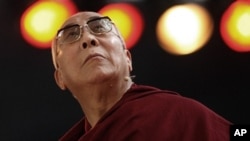China is warning the Dalai Lama he does not have the legal right to decide if he should be reincarnated. The statement comes after the 76-year-old said Saturday he plans decide when he is “about 90” whether he should be reincarnated and that China should have no say in the matter.
The Chinese foreign ministry warned the Dalai Lama Monday that only Beijing can approve his successor.
Chinese Foreign Ministry spokesman Hong Lei says any decision by the Dalai Lama to appoint a successor through traditional reincarnation would break Chinese law.
He insists that China endorses a policy of religious freedom including respecting and protecting succession in Tibetan Buddhism leadership. But Hong stresses China's historical claim to its rule over Tibet and says the title of Dalai Lama is only conferred by the central government in Beijing and is illegal otherwise.
The Dalai Lama formally stepped down as the head of the Tibetan government-in-exile in July, when Harvard-trained scholar Lobsang Sangay was sworn in as the new political leader.
On Saturday, the Dalai Lama said he will decide when he is about 90 years of age if he will be reincarnated. Traditionally, Tibetan monks identify a boy who shows signs he is a reincarnation of a late leader.
The 14th Dalai Lama says he will set clear guidelines to recognize the next leader while he was still physically and mentally fit to do. He says this will ensure there is no room for what he describes as deception.
The Dalai Lama set out his plan after a gathering of the four schools of Tibetan Buddhism in the northern Indian town, Dharamsala. where the Tibetan government sits in exile following China's military invasion and occupation in 1950.
The former prime minister of the exiled Tibetan government, Samdhong Rinpioche, says the meeting is discussing even if the Dalai Lama, as an institution, should continue.
"During this congregation, His Holiness the 14th Dalai Lama had conferred with the heads of religious traditions regarding his interim declaration about whether it is necessary to continue the reincarnation of Dalai Lama institution after the 14th," explained the former prime minister. "As he had announced as early as 1969 whether the Dalai Lama institution should continue or not, will be decided by the Tibetan People and His Holiness' position still continued."
The Dalai Lama, who fled the country in 1959 and has never returned, says he will consult the senior lamas, the Tibetan public and other concerned people who follow Tibetan Buddhism.
He says he will then re-evaluate whether the institution of the Dalai Lama should continue.
He says China will not have a say on the matter.
China is likely to appoint its own successor regardless.
This raises the prospect of two Tibetan spiritual leaders, with one recognized by Beijing and the other chosen by Tibetan exiles.
A similar scenario occurred in 1995 when China rejected the Dalai Lama's choice to be the next Panchen Lama and picked its own reincarnation, Gyaincain Norbu. The Chinese-raised Norbu is now 21 and publicly backs Beijing's rule of Tibet.
The Dalai Lama chose Gedhun Choekyi Nyima. He has not been seen since 1995 when he was detained by Chinese security forces.
China Warns Dalai Lama About Choosing Successor










